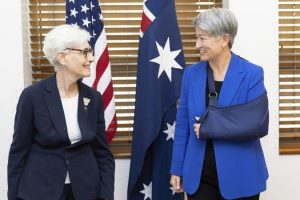‘A lot more to play out’: China to keep up pressure on Taiwan

As Beijing announced that it would continue its military manoeuvres around Taiwan without any end date as its forces prepare for “joint encirclement” of the island, a senior US official has said that the Taiwan crisis is not yet over.
Chinese President Xi Jinping will continue to pile pressure onto the self-governing territory while China goes through a “difficult time” at home, the US Deputy Secretary of State, Wendy Sherman, told The Sydney Morning Herald and The Age in an interview.
A People’s Liberation Army member watches military exercises, with Taiwan’s frigate Lan Yang in the background.Credit:Xinhua
After four days of military exercises that forced the diversion of some commercial shipping and aviation, China’s Eastern Military Command on Tuesday stated that it would extend its operations into a new phase.
The next drills were for its forces to prepare for “joint defence” and “joint encirclement” of Taiwan, it said in a statement. The People’s Liberation Army forces deployed 39 air force planes in and around the Taiwan Strait on Monday, of which 21 entered Taiwan’s air defence zone, according to Taiwan’s Defence Ministry. It said 13 mainland naval vessels were deployed.
The Chinese Communist Party propagandist Hu Xijin, former Global Times editor-in-chief, wrote: “Sealing off the island has become a reality that can be staged at any time, and the lifeblood of Taiwan is clearly in the hands of mainland China.”
However, Sherman contended that Beijing had not succeeded in “sealing off” Taiwan: “I don’t think we have a full-on embargo yet, so let’s not give credit to China that they don’t deserve,” she said in the interview during a visit to Canberra.
Penny Wong and US Deputy Secretary of State Wendy Sherman at Parliament House in Canberra on Monday.Credit:Alex Ellinghausen
“They have stopped some imports to and some exports from Taiwan but they haven’t cut off everything. They need that relationship; it’s important to both economies. Though we don’t know what’s going to happen here, I think the world is speaking out.”
She pointed out that the G7, ASEAN and, in a trilateral statement from the US, Japan and Australia, governments were calling on Beijing to cease its military manoeuvres: “So I think and hope that the PRC and Xi Jinping will understand that the world does not think that escalation is a good move here.”
The US State Department’s second most senior official said that the US suspected Xi would “continue to press Taiwan”. Sherman said: “There’s a lot more to play out here and Xi is headed toward his [Chinese Communist] Party Congress, we think in October.”
She implied that domestic circumstances in China played a key part: “And you know China is going through a difficult time. With COVID not under control yet, with an economy that is not growing as fast as they had hoped, so I’m not sure what he’s intending to do here, but it is making the world concerned.
“Because he’s the only one who is escalating the situation. Everyone else is calling for de-escalation and calm.”
In reacting to the weekend visit to Taiwan by US House Speaker Nancy Pelosi, Beijing suspended eight channels of communication with Washington. These included some defence dialogues, co-operation on narcotics and transnational crime.
They also included a dialogue on climate change, a decision Sherman said was “not in the interests of the world”.
“To suspend climate conversations is not in the interests of China, not in the interests of the world,” she said in the interview.
“I’ve just come from Samoa, Tonga and Solomon Islands. The Pacific islands understand that climate change is an existential threat.
“Islands have already disappeared because of sea level rise. And they don’t understand why anyone would stop a discussion about climate change. Indeed, the US Senate just passed historic climate legislation, it still has to go to the House. Here in Australia, there is consideration of climate legislation as well, it hasn’t gone through all the steps either.
“This is an indication of how important we – the US and Australia – think climate is and I hope that both of our countries continue on the path to take these historic steps because it’s quite, quite critical to the world and I’m quite surprised China doesn’t understand that.”
Get a note directly from our foreign correspondents on what’s making headlines around the world. Sign up for the weekly What in the World newsletter here.
Most Viewed in World
From our partners
Source: Read Full Article


